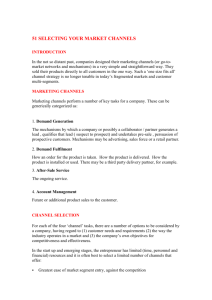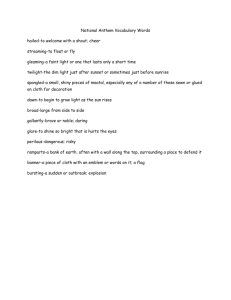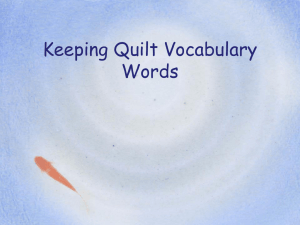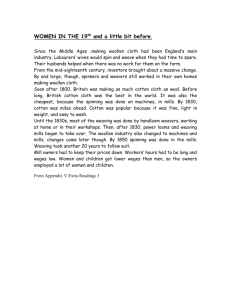Toddy Palm Cake
advertisement
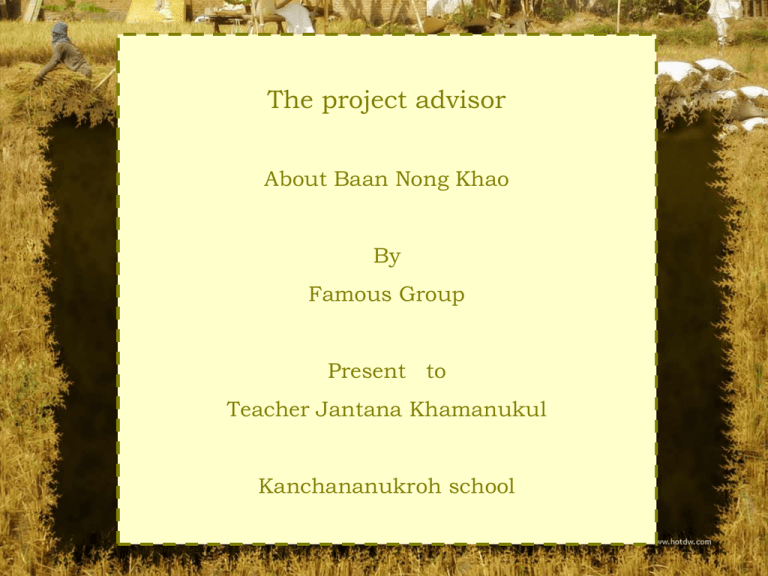
The project advisor About Baan Nong Khao By Famous Group Present to Teacher Jantana Khamanukul Kanchananukroh school Famous group m.5/8 1. Chudaporn Jenwattanamongkon no. 4 2. Kanitta Hemmapan no. 15 3. Thitiporn Sakunasing no. 16 4. Noppamas Maktan no. 26 5. Sawitree Sungjaisom no. 35 6. Sudarat Kongpanittakul no. 38 Baan Nong Khao Ban Nong Khao is one district in Kanchanaburi, about 12 km. away from the province. Ban Nong Khao is a village that is over 100 years old. In the Ayutthaya period when Burmese forces attacked Ayutthaya and Kanchanaburi was the frontline city, the villagers of Ban Nong Khao rallied to repel the attackers. Villagers here still live simply in an agricultural society and oldstyle houses practicing culture and traditions which has been transmitted from generation to generation. It has unique cultural identity of its own, that is, “100 -colored hand woven textile" and simple lifestyle like ancient classic Thai cultural identity from the old days. Hailed as “Land of civilization of the western region". Tourists can experience rice pounding, Thai typical desserts, molded sugar production, tonsuring ceremony, ricegrowing, Phleng Yoei and Phleng Phuang Malai folk singing. Cloth weaving at Baan Nong Khao Cloth weaving at Ban Nong Khao village started long time ago. Ban Nong Khao village women weaved cloth during free time from rice farming. The woven cloth was for home consumption, for souvenirs, or for family members use during festivals and traditions. In the past, the weaving was done with the use of the waist loom, and hand. In the past, cloth weaving methods and techniques were passed to family members and relatives; but at present, there were cloth weaving classes offered in the houses of cloth weaving experts in the village. Hand woven clothes of Ban Nong Khao village comprised the loin cloth, plain cloth, and “mat mee” cloth. However, the generally woven and popular cloth among locals and visitors was the loin cloth, Hand woven cloth of Ban Nong Khao village was used to make many products to promote its utilization. The formation of cloth weavers into groups in the early stage was in line with the type of looms used, i.e., the hand loom group, and the shuttle loom group. At present, the groups were formed based on particular objectives or functions, such as, the voluntary weaving women group, the dying group, the weaving women group of Suvarnabhum Agricultural Cooperative Limited, and free lance weaving groups under other financial supporters. Consumers of Nong Khao hand woven cloth comprised local Ban Nong Khao villagers (50 percent), and regular customers and passer-bys (50 percent). Problems and obstacles of the hand woven cloth production occupation of Ban Nong Khao village were the lack of weaving personnel during the rice farming season, resulting in insufficient cloth production for the market, and the lack of capital for purchasing raw materials for the dying groups. As for the future trend, the hand woven cloth production occupation would still be with Ban Nong Khao village, due to the reasons that the villagers still value the wearing of their local hand woven clothes, and take pride in the identity and beauty of local cloth and their various products; and that the clothes and their products are still highly popular with people from other places. Therefore, the hand woven cloth occupation would continue to thrive and be a community business that could generate incomes, create jobs, and be a supplementary occupation for women groups in the community to achieve on-going sustainable self-reliance. Palm Trees Palm trees are popular among rice growers to plant at the edges of rice fields. They can earn extra income from their products. In January, heads of families will climb the trees and bring palm sugar juice for sale in the community, while housewives are making round cake palm sugar for seasoning food in the future. Toddy Palm Cake Thai desserts have passed a long history, once they were praised about their deliciousness and elaborate creating in a king’s rhyme. Some of them are easy to cook, but has a wonderful flavor. The fruit from toddy palms can also be eaten and are rich in vitamins A and C, and can be eaten as young fruits, which are soft and juicy and somewhat like lynches but milder and with no pit, or old fruits, which are harder and less juicy. It is this toddy palm pulp that these cakes are made of, along with rice flour, yeast, palm sugar, coconut cream and coconut milk. Toddy Palm Cake they're kind of like sponge cake, a little sweet and different tasting than regular sugar. Palm sugar The taste of pure coconut palm sugar resembles that of brown cane sugar, yet with more rounded caramel & butterscotch notes without the metallic ending flavor that brown cane sugar has. It is a wonderfully rich flavor. For cooking purposes, it has a very low melt temperature and an extremely high burn temperature. The sugar is a golden brown granule or paste, sold in tubes, blocks or tin cans. Liquid versions of coconut palm sugar is also now available from Sweet-Tree. It may be light-colored or dark, soft and gooey or hard. As a lightly-processed product of cottage industry, it varies greatly from batch to batch. There are various forms of coconut palm sugar available on the market. The coconut palm sugar found in Thai markets generally are not 100% pure coconut palm sugar, but is blended with white cane sugar and also malt sugar. These tend to white hard blobs. It's important to discern which product you're looking for; a pure coconut palm sugar or a coconut palm sugar mixed with other sugars. Each product has it's use, yet to experience the true delicious taste of pure coconut palm nectar, make sure to purchase the pure form of the product. Shrine of father and mother This wooden shrine has been created from the ancient times according to ancestors beliefs. It is located in the middle of Nong Khao Village. Whenever suffering from any borrow or wishing to hold any fair or festivals. Nong Khao people will pay homage to it. Light joss sticks. And request for the accomplishment of work. At present a traditional making-merit ceremony is annually hold on the first day of waning moon and the sixth lunar month. Buddhist monks will be invited to make evening chants. And accept offerings in the morning. After that Nong Khao local people will pay homepage to shrine by offering food water dessert and “Bye Sri” cooked rice. Certain foods and fruits topped with boiled eggs and decorated with flowers. A Chedi (Pagoda ) at Rang Chan Temple The chedi is a symbol at the nong khao district, located on the left of the road leading to the village from Kanchanaburi province. In the reign of Ayudthaya. It was built with bricks and cement and had an irregular square base consisting of 3 small corners at each of the 4 corners. It is said by the old that people usually build a chedi dig a pond and construct a building in which to rest in. it is assumed that the chedi at Rang Chan temple was constructed on a piece of land belonging to Mrs. Chan At present only the chedi and the pond still remain in the area because the rest building was destroyed during Burma’s invasion. Culture yard The culture yard is a tourist place to perform a light and sound folk drama entitled “Mr. Boon&Tong of Ban Nong Khao”. It was first performed in 1998 (B.E. 2541) to show unity of Ban Nong Khao local people in seriously conserving culture. The folk drama consists of local plays, folk songs and tradition, e.g., a rice – growing ceremony. A topknot ceremony. Songkran festival and folk song singing called “Yoei”. As a result new generations of local people are proud of them and love their community. Ram Yoei or Dance Yoei It is a kind of folk music play more than 500 years. This dance is always during Songkran and New Year holidays. There are male and female players is the from of a circle. The player has a turn to sing their own verses are accompanied by his player who clap their hands in rhythm. Some players take turn to dance with music from the long-drum band. Male players wear round neck shirt with loincloth on the shoulder. Female players dress in costume with Thai Sabai cloth tied around the upper part of the body. The piece is now increasingly popular in Nong Khao district. Ban Klang Tung Organic Home The story of Ban Klang tung is spread continuously by word of mouth – a remarkable couple in a remarkable place. Ban Klangtung Organic Home is a welcoming home-stay where Aunty add-Thippawan and Uncle Khon-Sakhon Prasertkul built a little house they hoped to use for their own retirement. One day, Aunty Add welcomed a guest to her home and she realized that sharing her natural way of life could help make the world a better place. So she built another small house with a wide veranda, decorated every last corner by herself with charming bric-a-brac, and created 3 room, each with its own character. All bedding has been carefully chosen with none being bleached or dyed. In front of main house, another guest house has been built to accommodate other guests. Everybody comes for the same reason, to escape their chaotic lifestyles, relax in a slower-moving natural world, and experience the many activities that reflect the traditional Thai way of life. This can be done by resting under the shade of the big trees, using the reading corner and he hammocks, and simply admiring the lush green rice paddies out the front. Aunth Add welcomes everybody with butterfly pea juice, a local herbal delicacy. All guests can learn how to make this juice with Uncle Khon, an expert in Thai cooking." The butterfly pea is an easily found local flower that can be made into a refreshing juice. Lt illustrates the simplicity of Thai life and the use of everyday objects,” says a smiling Aunty Add, offering a juice to a newlyarrived guest. Those who want to sample traditional ‘Thai ness’ can make a FLOWER ARRANGEMENT IN A BANANA LEAF VASE after sharpening coconut palm sticks and arranging their flowers to their own design. Many of the activities at Ban Klangtung Organic Home explore the bond with nature that modern generations may be neglecting. One example is fish-weaving.“ ln the past, Thais used woven palm leaf fish to relax tired kids. Because we had no toys we used our knowledge of natural objects to weave the fish and make children’s mobiles. This was not only for pleasure but also to enhance the children’s development,” she explains. Cooking is another activity that uses the natural resources of the surrounding environment. Uncle Khon is happy to share his skills with visitors. He creates the menu and asks the guests to select and pick the organic vegetable ingredients from around the house. The beautiful smell of hot curries from the kitchen is a testimony to his skills as he prepares another dish in the relaxed cooking area. Vocabulary 1.Province 2.Destination 3.Respectively 4.landscape 5.Nature 6.Such 7.Extreme 8.Western 9.Far 10.Waterfall 11.Mountain = = = = = = = = = = = จังหวัด,มณฑล จดหมายปลายทาง,จุดประสงค์ ตามลาดับ ภูมิประเทศ,ทัศนียภาพ ธรรมชาติ เช่นนี้,เช่นนั้น ใกล้ที่สุด,สุ ดท้าย มุ่งไปทางทิศตะวันตก ไกล,ห่าง น้ าตก ภูเขา 12.change 13.went 14. light 15.kind 16.off 17.need 18.house 19.picture 20.try 21.us 22.again 23.animal = = = = = = = = = = = = เปลี่ยน, เปลี่ยนแปลง, ผลัด, แลก, ไป, กลายเป็ น, เดิน, ดาเนิน ไฟ, แสง, ตะเกียง, ,สว่าง, สี อ่อน จาพวก, ชนิด, ประเภท ไปเสี ย, พ้นไป, หมดเกลี้ยง, ห่างจาก ความจาเป็ น, ของจาเป็ น, ต้องการมาก บ้าน, เรื อน, ที่อาศัย ภาพ, ภาพวาด ลอง, ทดลอง, พิสูจน์, พยายาม เรา อีก, อีกที, อีกครั้ง สัตว์ 24. never 25. last 26. let 27. thought 28. city 29. tree 30. cross 31. farm 32. hard 33. start 34. might 35. story 36. saw = = = = = = = = = = = = = ไม่เคย, ไม่เลย, ไม่มีอีก หลังสุ ด, สุ ดท้าย, ปลาย อนุญาต, เปิ ดเผย, ยกโทษให้ คิด, พิจารณา, เห็นว่า เมืองใหญ่, นคร, กรุ ง ต้นไม้, ไม้ยนื ต้น กากบาท, ไม้กางเขน, ไขว้ นา, ไร่ , ที่เพาะปลูก แข็ง, รุ นแรง, ทรหด, ยากเย็น ออก, เริ่ ม, ตั้งต้น, เดินเครื่ อง อาจจะ, สามารถจะ, คงจะ เรื่ อง, เรื่ องราว,นิทาน, ประวัติ เห็น, มอง, ดู, ตรวจดู
